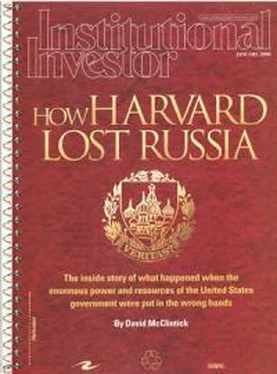How Harvard Lost Russia
David McClintick
Anne Williamson

Table of Contents
How Harvard Lost Russia
How Harvard Deep-Sixed Its Russian Scandal
Harvard Mafia, Andrei Shleifer and the Economic Rape of Russia
Chronicles of Harvard University Russian Economic Team Scam and Deep Corruption of Academic Economics
Introduction
Academic Mafiosi as a Social Class
Academic Mafiosi as Byproduct and Simultaneously Enablers of Neoliberalism
Economic rape of post USSR economic space was by design not by accident
Larry Summers was not only defender but also the handler of Andrei Shleifer
Opium for the masses: Neoclassical economics role under neoliberalism as equivalent of the role of Catholic Church under feudalism
MI6 role in economic rape of Russia, Ukraine and other post Soviet republics
Would Harvard Ever Help Russia
INVESTIGATIVE DOCUMENTS - Related articles
Would Harvard Ever Help Russia?
McClintick's Report, Or Silence Breaks Down
National Glasnost via The New York Times
Janine Wedel the Whislte Blower
The Blessing of August 1998 Default
The Open Letter to Bill Clinton
A New Wave of Russophobia?
Privatization of Russian Industry
Anatoli Chubais
Yeltsin’s Privatization Program
First Phase of Privatization in Russia
Russian Privatization Auctions
Politics and the Second Phase of Russia’s Privatization
Privatization and Yeltsin's 1996 Reelection
Rigged Auctions of Russian Privatization
Oligarchs
How the Oligarchs Obtained Their Assets
How the Oligarchs Got Very Rich
Yeltsin and the Oligarchs
Loans for Shares Deals Between Yeltsin and the Oligarchs
Failure of Privatization in Russia
How Clinton & Company & The Bankers Plundered Russia
Contagion can be read on many different levels.
The Third Level
Double Effect
A Look Back: Anne Williamson and the Rape of Russia
Testimony of Anne Williamson
ONE ON ONE with Janine Wedel:
GSPIA scholar reveals how misguided U.S. economic aid hurt post-communist Russia
Kto Kogo?*
The NATO Syndrome, the EU’s Eastern Partnership Program, and the EAU
Who’s Sorry Now?
Stop! Thief! Stop!
The Globalists’ Russia Game
The Many Reinventions of Jeffrey Sachs
How George Soros Got His Mojo Working in Ukraine
Beyond Imagination: Uranium One
5 reasons Ukraine will soon cease to exist
How Harvard Lost Russia
David McClintick
January 13, 2006
https://www.institutionalinvestor.com/article/b150npp3q49x7w/how-harvard-lost-russia
The best and brightest of America's premier university came to Moscow in the 1990s to teach Russians how to be capitalists. This is the inside story of how their efforts led to scandal and disgrace.
Since being named president of Harvard University in 2001, former U.S. Treasury secretary Lawrence Summers has sparked a series of controversies that have grabbed headlines. Summers incurred the wrath of African-Americans when he belittled the work of controversial religion professor Cornel West (who left for Princeton University); last year he infuriated faculty and students alike when he seemed to disparage the innate scientific abilities of women at a Massachusetts economic conference, igniting a national uproar that nearly cost him his job; last fall brought the departure of Jack Meyer, the head of Harvard Management Co., which oversees the school's endowment but had inflamed some in the community because of the multimillion-dollar salaries it pays some of its managers.
Then, in quiet contrast, there is the case of economics professor Andrei Shleifer, who in the mid-1990s led a Harvard advisory program in Russia that collapsed in disgrace. In August, after years of litigation, Harvard, Shleifer and others agreed to pay at least $31 million to settle a lawsuit brought by the U.S. government. Harvard had been charged with breach of contract, Shleifer and an associate, Jonathan Hay, with conspiracy to defraud the U.S. government.
Shleifer remains a faculty member in good standing. Colleagues say that is because he is a close longtime friend and collaborator of Summers.
In the following pages investigative journalist David McClintick, a Harvard alumnus, chronicles Shleifer's role in the university's Russia Project and how his friendship with Summers has protected him from the consequences of that debacle inside America's premier academic institution.
Abbreviations
AEW - AEW Capital Management (Boston)
AID - The State Department's Agency for International Development
CSFB - Credit Suisse First Boston was the investment banking division of Credit Suisse Group, prior to 2006. It was active in investment banking, capital markets and financial services.
FRSD - First Russian Specialized Depository
HIID - Harvard Institute for International Development
RSEC - Russian Securities and Exchange Commission
USAID United States Agency for International Development
Off duty and in swimsuits, the mentor and his protégé strolled the beach at Truro. For years, with their families, they had summered together along this stretch of Massachusetts' famed Cape Cod. Close personally and professionally, the two friends confided in each other the most private matters of family and finance. The topic of the day was the former Soviet Union.
"You've got to be careful," the mentor, Lawrence Summers, warned his protégé, Andrei Shleifer. "There's a lot of corruption in Russia."
It was late August 1996, and Summers, 42, was deputy secretary of the U.S. Treasury. Shleifer, 35, was a rising star in the Harvard University economics department, just as Summers had been 15 years earlier when he had first taken Shleifer under his wing.
Summers' warning rose out of their pivotal roles in a revolution of global consequence -- the attempt to bring the Russian economy out from the ruins of communism into the promise of Western-style capitalism. Summers, as Treasury's second-in-command, was the architect of U.S. efforts to help Russia. Shleifer's involvement was more intimate. Traveling frequently to Moscow, he was directing key elements of the reform effort under the banner of the renowned Harvard Institute for International Development.
Working on contract for the U.S., HIID advised the Russian government on privatizing its economy and creating capital markets and the laws and institutions to regulate them. Shleifer did not report formally to Summers but rather to the State Department's Agency for International Development, or AID, the spearhead of the U.S.'s foreign aid program.
Personal affection as much as official concern prompted Summers' admonition. He had come to know that Shleifer and his wife, Nancy Zimmerman, a noted hedge fund manager, had been investing in Russia. Though he didn't know specifics, he understood just enough to worry that the couple might run afoul of myriad conflict-of-interest regulations that barred American advisers from investing in the countries they were assisting.
Читать дальше







![Джонатан Димблби - Barbarossa - How Hitler Lost the War [calibre]](/books/385421/dzhonatan-dimblbi-barbarossa-how-hitler-lost-the-w-thumb.webp)





